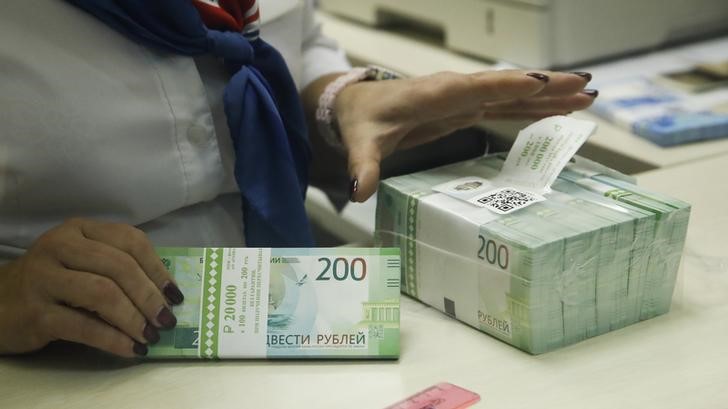 © Reuters. A cashier holds new 200 rouble banknotes in a bank in Moscow
© Reuters. A cashier holds new 200 rouble banknotes in a bank in MoscowBy Andrey Ostroukh
MOSCOW (Reuters) – A sell-off in Russian markets triggered by the latest round of U.S. sanctions may drive up inflation and cap an economic recovery this year, but the overall impact is expected to be limited for now.
Investors’ initial reaction to the sanctions announced on April 6, targeting several major companies and individuals thought to have ties to President Vladimir Putin, was to dump Russian assets.
Citi said after a round of calls with investors that they were concerned the sanctions and market slump would “lead to deterioration in overall growth, the fiscal position, forex reserves, and one investor felt this could move inflation higher.”
But analysts and government officials have been in no rush to revise their economic forecasts for the year.
“Implications for the real sector of the economy are possible only if negative trends in financial markets are here to stay for the long term,” the economy ministry said on Monday after a turbulent week in the markets and for the currency.
The rouble lost nearly 9 percent of its value over four days, sending it to 65.06 versus the dollar on April 11, its weakest since 2016
But it has since reversed course, quickly heading back to its levels before the sanctions, firming up to 61.5 per dollar on Wednesday.
A weaker rouble along with higher prices for oil, Russia’s biggest export earner, put Moscow in a better position to withstand shocks in global markets and repay debts.
When the currency weakens, exporters earn more in rouble terms for selling goods abroad in dollars. Higher oil prices magnify this effect and also bring the finance ministry more dollars for the state’s foreign currency reserves, which stood at $459 billion as of early April.
But the sanctions raise concerns about Russia’s ability to continue its fragile recovery amid a host of international political problems including the war in Syria and Russia’s diplomatic relations with the West.
“Whatever you think of the strength of sanctions, I think the worsening geopolitical setting will just further stall much needed foreign direct investment into Russia,” said Timothy Ash, senior strategist at BlueBay Asset Management.
“Russia’s economic isolation will deepen.”
For now, Russia is still recovering after two years of recession sparked in 2014 by a drop in oil prices and a first wave of Western sanctions designed to punish Moscow for its role in the Ukrainian crisis.
Before the latest sanctions, inflation in Russia was seen near record lows below 4 percent in 2018, while the economy was seen growing 1.5 to 2.0 percent.
INFLATION
Inflation is likely to be the first economic indicator to feel the impact of the sell-off in Russian markets. Higher inflation could alter the central bank’s plan for further cuts to its key interest rate, now set at 7.25 percent.
A weaker rouble will translate into higher prices, as was the case in early 2015 when annual inflation spiked to around 17 percent, due to Russia’s dependence on imports.
The central bank’s head of monetary policy said the weaker rouble could affect inflation as soon as in May, prompting market players to scale back expectations for more interest rate cuts this year.
Even though there were “no super serious risks for inflation,” the central bank may postpone the next rate cut, said Stanislav Murashov, an analyst at Raiffeisen Bank in Moscow.
Looking forward, the central bank may cut rates to support economic growth with cheaper lending.
“In the longer term, even greater monetary support (is) needed to improve domestic growth prospects,” Rosbank, a subsidiary of Societe Generale (PA:), said in a note.
INVESTMENT, BUDGET
Investment activity, including foreign investment and the investment programmes of Russian companies, is widely expected to drop in the wake of the market sell-off and sanctions.
The geopolitical confrontation caps companies’ ability to raise capital on the global markets, according to a combined study by Gaidar Institute, a Moscow-based think tank, and the Russian Presidential Academy of National Economy and Public Administration.
“The conclusion – a likely low and even declining pace of investment growth and a lingering exit of the economy from the pause in investment,” the study said.
As the rouble drop coincided with a rise in prices for oil, Russia is on track to raise more roubles selling commodities abroad for dollars.
“At a time when the global economy remains healthier and commodity prices are supported by strong demand, the relative weakness of the rouble benefits Russia’s commodity producers,” Goldman Sachs (NYSE:) analysts said.
Higher rouble revenues, however, does not mean Moscow will increase its budget spending to beef up the economy.
Instead, the finance ministry is likely to buy more dollars for the state coffers under its budget rule, meaning its reserves will grow quicker than previously thought, said Murashov from Raiffeisen.
Source: Investing.com





























